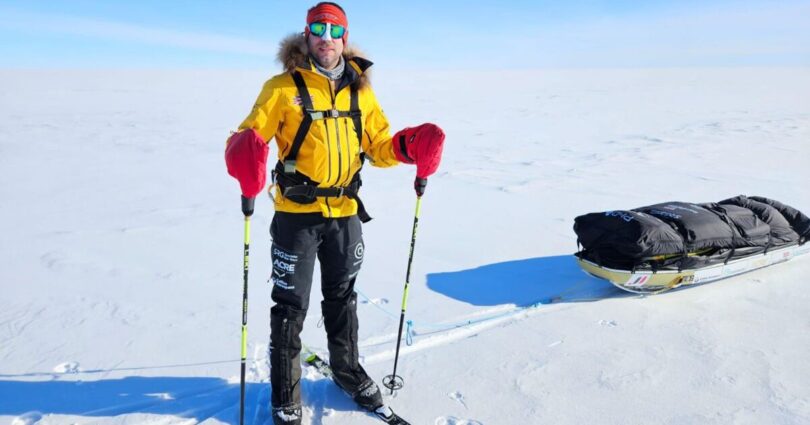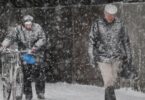Explorer Jonny Huntingdon aims to be the first disabled person to solo trek to the South Pole (Image: Steve Jones)
If, like the vast majority of us, you spent Christmas Day demolishing groaning plates of turkey and sprouts before settling down with a tin of Quality Street in front of the King’s speech, then spare a thought for Jonny Huntington. The British explorer’s Christmas involved skiing across a snowy wasteland, dragging his equipment and provisions on a sledge weighing about 242lbs, without so much as a penguin for company.
After 11 hours, every muscle and joint aching, he erected his tent, boiled up his freeze-dried food in melted snow, and curled inside his sleeping bag.
On the plus side, as he says, speaking to the Daily Express on a satellite phone earlier this week: “It’s certainly a white Christmas for me!”
All going well, the 38-year-old should reach his destination in early January, becoming the first ever disabled person to ski solo and unsupported to the South Pole.
Just 51 people have completed the journey unsupported – all able-bodied.
“I’m feeling pretty good,” he enthuses, before admitting to “moments of feeling slightly miserable. But it’s all self-inflicted so I can’t be too miserable. And mainly it’s incredible to be doing it: it’s been five years in the making”.
Since Jonny began his gruelling ski-trek, he’s seen nothing but snow and ice, a relentlessly featureless landscape with no wildlife or even trees.
“Barring a handful of days when I could see some mountains, hundreds of kilometres away, there is nothing to see, just white wherever you look. It’s a white desert,” he admits.
His gruelling mission would be hard enough for your average ultra-fit tough guy. But Jonny has limited mobility due to permanent brain damage.

Huntingdon is braving -20C temperatures and bone-chilling winds on his journey (Image: Jonny Huntingdon)
In 2014, aged 28, he was training in the gym one day when he suffered a sudden, dramatic brain bleed that left him paralysed from the neck down on his left side. The stroke was devastating not just physically but emotionally.
Eight weeks earlier, he had completed his Sandhurst training and been commissioned into the British Army. Watching videos of him dragging that heavy sledge – unlike Father Christmas he doesn’t have any reindeer, or even huskies – it’s hard to believe that 10 years ago, he was unable to walk. It took years of rehab and, even now, he has limited movement on his left side.
There were dark days as he came to terms with the loss of his military career and the future he had envisaged. Key to his mental recovery was the Armed Forces Para Snowsport Team, which fuelled a love of cross-country skiing, and he joined the new GB Para Nordic ski team.
Jonny is no stranger to demanding physical challenges. He walked all 630 miles of the South Coast path in one go, ran from Manchester to London in 11 days and spent weeks dragging heavy tyres across the countryside to prepare for pulling the sledge, as well as completing a 20-day solo expedition in Sweden’s snowy north.
While proving no challenge is insurmountable even with a disability, he’s raising money for charities that helped his recovery: the Armed Forces Para-Snowsport Team (AFPST), the Adaptive Grand Slam (AGS), and the Invictus Games Foundation (IGF) and Team Forces.
It’s the knowledge he’ll be helping others – and his phenomenal reserves of grit and determination – that keeps him going. “I have got a pretty high boredom threshold,” he jokes, “But it does get pretty tedious. I need distractions when my legs are hurting, but at other times I need to focus.”

Huntington, travelling by plane to begin his trek, suffered a serious stroke aged 28 (Image: Steve Jones)
Any lapses in concentration could be fatal. There are crevasses – “If I fall in one then it will end the expedition straight away,” he says bluntly – and bumpy ice formations called sastrugi, like sand dunes but ridged and icy. They’re difficult to pull the sledge over.
“Due to my disability, my left leg doesn’t really produce enough force to get me and the pulk [sledge] moving over one of these divots.”
Although it is minus 20C, with winds of 30km the windchill makes it feel more like minus 30C, it’s the Antarctic summer and the sun shines 24 hours a day – he wears a mask to sleep – meaning the snow is softer and more powdery than normal. Fresh snowfall makes the skiing tougher still.
“The main problem with my left leg is that one of my toes is badly bruised, because the foot is still completely paralysed. When you take a system that is half compromised and ask it to do something like this, the healthy side gets an absolute kicking.”
The resilience that helped him to recover from his stroke is certainly serving him well. “We knew it was going to be like this. I’m desperately hoping that I have got enough in the tank to get to the end in time.”
There is an unspoken “or else” in that he only has limited supplies of food and already he is five days behind schedule due to the soft snow. The anticipated journey time of 40 days is now looking more like 45. While the temperature may be warmer than expected, it’s still dangerously cold. “It’s very easy to forget that your nose or a bit of skin is a bit exposed. That can have a big knock-on effect, the rest of you will shut down pretty fast,” he says.

Jonny uses melted snow to prepare the freeze-dried meals in his tent (Image: Jonny Huntingdon)
“Any tiny outlet where the cold can get in can cause dramatic system failure. If you get frostbite, it can inhibit you from doing other stuff. You can drift off in your own head, but you still have to be very aware of your surroundings.”
His only concession to Christmas Day? Some chocolate marzipan with his rations and a phone call with his family back home in Devon. It’s the support of family, friends and his team who are tracking him across the snow that are key to his morale.
“You are very remote – but everyone knows where you are. I’ve been incredibly lucky throughout the whole trip: the one thing I haven’t had to worry about is the psychological burden of being all alone on the ice.” People have been sending music to listen to and he gets a constant stream of messages from friends and strangers. When he reaches the pole, a plane will fly him back to base on the Union Glacier, and from there to Chile and eventually home to Devon and his mother, sister, and 18-month-old niece for some belated Christmas celebrations.
There is no Mrs Huntington waiting to greet this polar explorer on his return. “I am completely single,” he chuckles, “If anyone wants to know.”
When he gets back home, he’s looking forward to a pint of Salcombe Pale Ale from his local brewery, and putting his bruised and battered feet up. But this iceman won’t stay still for long: he’ll be planning the next arduous challenge before most of us have taken the Christmas decorations down.
● Donate to Jonny Huntington’s fundraising via givestar.io/gs/south-pole-solo-expedition
Source link








